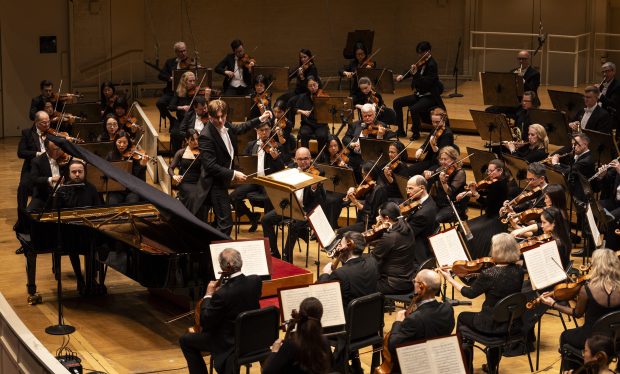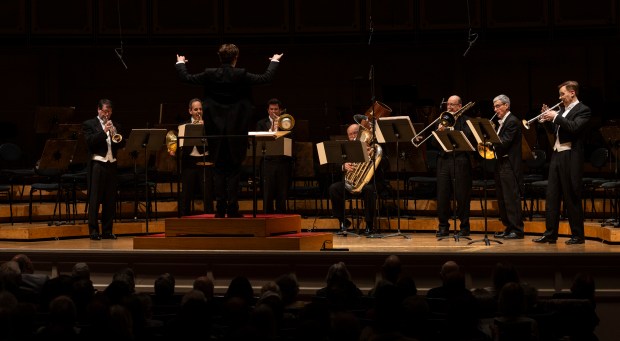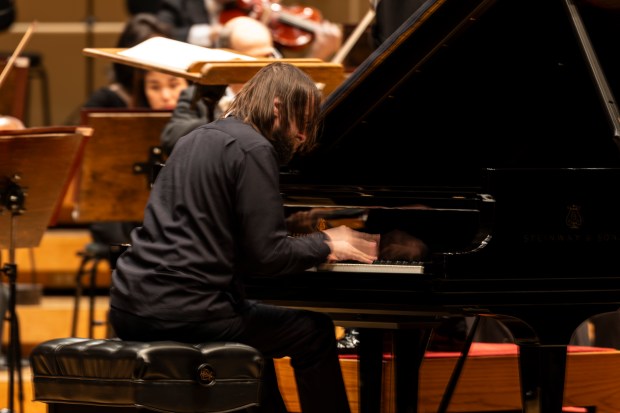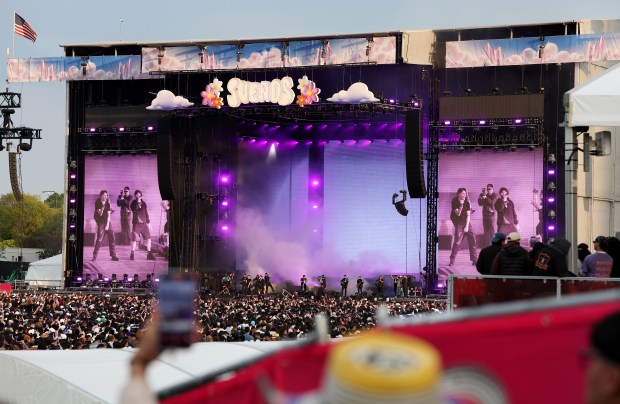At a Chicago Symphony rehearsal this week open to the press and orchestra donors, music director designate Klaus Mäkelä halted the orchestra while working on Dvořák’s Symphony No. 7.
“We know it will be a long line, yeah?” he said to the violins. As he said it, the young conductor assumed the stance of an explorer, shielding his eyes and pointing to an imagined horizon.
Reflecting on Mäkelä’s appearances on April 24 and May 1, I returned again and again to this directive. Both concerts evinced the infectious energy and sonic dazzle that inspired the CSO to hire him in the first place. But they also probed ensemble areas which require investment and attention — that “long line,” so to speak, made even longer by the fact that Mäkelä doesn’t fully assume the CSO post until 2027.
Last week, he returned to Gustav Mahler, the composer whose symphony sealed Mäkelä’s partnership with the CSO and who will be the subject of an upcoming orchestral summit in Amsterdam, another home-base-to-be for the Finnish conductor. His choice of repertoire was characteristically ambitious: Mahler’s Third Symphony, the longest in the standard repertoire at about 100 minutes long.
This time around, Mäkelä didn’t relay the same end-to-end momentum and delicious abandon as 2023’s Fifth — still a high bar for Mahlers at Orchestra Hall, under any baton. Instead, Mäkelä’s Third dwelt on the CSO’s impassioned ensemble sound. He had much to love: After a sleepy couple of months at Orchestra Hall, hearing the CSO give their all under Mäkelä was like a blast of fresh alpine air. (The orchestra was similarly energized under conductor Jaap van Zweden, which bodes well for their forthcoming tour to Amsterdam’s Mahler Festival together.)
The first movement is pocked with all-orchestra rests, which tend to give the music an air-clearing effect. Under Mäkelä, the silences themselves sung, articulating the music’s bleakness rather than offering a respite from it. If a symphony must embrace everything, as Mahler’s old saw goes, it must, too, embrace silence. After a mostly moment-by-moment first movement, a reverent sixth and final movement hit that point home, its spaciousness calling back to the symphony’s introduction with far-sighted acuity.
Last week’s Mahler 3 also marked Mäkelä’s first CSO appearance with singers. Based on Thursday’s performance, vocalists — both solo and ensemble — seem to be in good hands. Contralto Wiebke Lehmkuhl sang her fourth-movement solo with elemental authority, her phrasing thoughtful and vowels warmly rounded. In the fifth movement, the treble voices of the Chicago Symphony Chorus and Uniting Voices Chicago (formerly Chicago Children’s Choir) melded, handsomely, into one ringing body. It helped that Mäkelä cloaked the orchestra’s sound ever so slightly for the benefit of the soloist and singers, just as he did for last year’s Shostakovich cello concerto. Even Lehmkuhl’s low-middle range landed squarely for listeners in the lower balcony.
Against the Mahler, Mäkelä’s Dvořák 7 (continuing through this weekend) came away as a more cohesive musical statement. In performance, Mäkelä maintained that “long line” through the entire piece: Returning motives varied slightly but effortlessly, as though being sung in real time. The string hiccup beginning the Scherzo theme was whistle-clean; rather than beating through busy sections, Mäkelä resurrected his favored move of pointing at instruments with moving lines, or, occasionally, mouthing along to them.
The third movement melted into the fourth with ease, making natural bedfellows of two very different movements. The performance seemed to just flow as though coasting across the score, rather than the Mahler’s burrowing.
The ride was bumpier on the rest of the May 1 program. Programming Pierre Boulez’s “Initiale,” a brass septet, was a great idea in theory: The late conductor-composer’s centenary has been mostly overlooked at Orchestra Hall, and at four minutes long, the piece is plenty audience-friendly, not to mention a showcase for the storied CSO brass. Instead, the performance was dispiritingly coarse, only gaining confidence and clarity as it went on — which, for a piece that short, is too little, too late.
Pianist and artist-in-residence Daniil Trifonov’s appearance with the orchestra, playing Brahms’ Piano Concerto No. 2, also improved as it went along. The fearsomely talented pianist tends to follow his own whims behind the keyboard — a guarantee of fresh and sometimes idiosyncratic performances, like Thursday’s. (Mäkelä again impressed in his solo support role here, catching Trifonov’s fluctuations with eagle-eyed precision.) All the Trifonov hallmarks were there: rubbery, supple hands that glide across the keyboard, and an unabashed interiority that gives the sense, at times, that Trifonov is playing for an audience of one. Trifonov carried that spirit forward into the final Allegretto grazioso movement, its first notes beginning with the same awed hush as the end of the Andante.

More uncharacteristically, the typically impeccable pianist tripped a couple times in Thursday’s performance: a note flub in the first movement, a brief brain freeze in an exposed moment in the second. One wonders if that, on top of the concerto’s immense bulk, played into the exacting Trifonov’s decision to leave audiences with just a whiff of an encore: Chopin’s Prelude No. 10, all of 30 seconds long.
CSO musicians delivered on the concerto’s big solo moments, mostly. Principal cellist John Sharp sang above the haze of the Andante with a noble tone and tender phrasing. So did assistant principal horn Daniel Gingrich, his sound willowy and fluid. Less so for his colleague, principal horn Mark Almond, whose opening horn call kicks off the concerto. Almond has seen a few strong performances in recent months, including a poised turn in Jaap van Zweden’s Mahler 7 last month. But his features in Mäkela’s concert weeks — in Mahler 3 and the Brahms — sounded tentative in the extreme.
Mahler 3 likewise saw some good nights for principals and troubled nights for others. Principal trumpet Esteban Batallán returned for these concerts with a post horn solo to remember, wistfully sounding from Orchestra Hall’s rafters. (Mahler’s score directs the soloist to emulate the effect of a horn call moving closer; in these performances, Batallán actually did so, playing his first solo from the fifth floor corridor, his second from the entrance to the hall’s ceiling, and his final solo directly above the stage, on a catwalk.) Concertmaster Robert Chen, settling back into the orchestra after a pinched nerve, saw opposite fortunes in the first movement, with stoic solos that often trotted ahead of his colleagues and Mäkelä’s beat.

Ups and downs in various principal seats only made trombonist Timothy Higgins’ contributions, leading that section, all the more commendable. After winning the CSO’s principal trombone audition last month, Higgins, of the San Francisco Symphony, has joined the orchestra for some trial weeks, starting with van Zweden’s Mahler 7. But it was Mahler 3, and the first movement’s many trombone solos, that were his true testing ground. Over the course of the movement, brawny eloquence gave way to vulnerability, as though he was curling inwards — a unified statement across the movement’s sprawl. A week later, Higgins was MVP again as an anchor in the rough tides of the Boulez.
If the deal gets sealed, Higgins will be Mäkelä’s second hire to the orchestra after violinist Gabriela Lara — also a standout player. The last three weeks would indicate he’s passed, colors a-flying.
Hannah Edgar is a freelance critic.
The Rubin Institute for Music Criticism helps fund our classical music coverage. The Chicago Tribune maintains editorial control over assignments and content.
Program repeats 7:30 p.m. Friday and Saturday and again 3 p.m. on Sun., May 4; tickets $75-$399 at cso.org.
Also worth noting
The arts calendar has gotten fuller in recent weeks. Chicago Opera Theater announced its coming season, with Chicago premieres of works by Kurt Weill and Antonio Salieri, while the Grant Park Music Festival and CSO have grown theirs slightly. Grant Park adds a performance by violinist Joshua Bell on Aug. 6, and the CSO tacks on concerts of John Williams’ film music (June 23, 2026), the Ravi Shankar Ensemble (March 22, 2026) and ranchera star Aída Cuevas (Sept. 26).
Symphony Center’s jazz series also announced its 2025-26 season programming this week, and with it a new guest curator model. Kate Dumbleton, director of the Hyde Park Jazz Festival, and Mike Reed, drummer, venue owner and festival programmer, are each tasked with curating a concert in the spring. The full SCP Jazz lineup is as follows; tickets are on sale Aug. 6 at cso.org:
- Bassist Christian McBride and pianist Brad Mehldau playing duo, 8 p.m. Oct. 10; tickets $39-$119.
- Herbie Hancock (note Sunday date), 8 p.m. Oct. 26; tickets $55-$199.
- Joshua Redman Quartet feat. singer Gabrielle Cavassa, playing selections from 2023’s “where we are” and the forthcoming “Words Fall Short,” 8 p.m. Nov. 7; tickets $39-$119.
- 50th anniversary of Marvin Gaye’s “I Want You” with singers José James and Lizz Wright, 8 p.m. Feb. 6, 2026; tickets $39-$119.
- Double-bill of saxophonist Nubya Garcia and singer Somi, curated by Kate Dumbleton, 8 p.m. March 13, 2026; tickets $29-$119.
- Miles Davis centenary tributes by pianists Gonzalo Rubalcaba and John Beasley, 8 p.m. March 27, 2026; tickets $39-$119.
- Drummer and curator Mike Reed explores his “Chicago Inspirations,” including a tribute to bassist Fred Hopkins and a suite of compositions written by Chicagoans between 1980 and 2010. 8 p.m. May 1, 2026; tickets $29-$119.
- Wynton Marsalis and the Jazz at Lincoln Center Orchestra, 8 p.m. June 2, 2026; tickets $55-$199.




